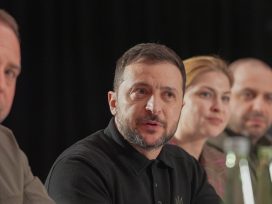
The ‘Trump–Putin deal’ again places Ukrainians in a subaltern role. The leaked contract with its fantasy $500 billion ‘payback’ has been compared to Versailles, but the US betrayal recalls nothing so much as Molotov–Ribbentrop.
Nationalism in Belgium might be different from nationalism in Ukraine, but if we want to understand the current European crisis and how to overcome it we need to take both into account. The debate series “Europe talks to Europe” is an attempt to turn European intellectual debate into a two-way street.
At the “Europe talks to Europe” debate in Bucharest in March 2010, Romanian economist and former minister of finance Daniel Daianu was asked whether the financial crisis has opened up a new divide between western and eastern Europe. He protested loudly. It might very well be that the crisis initially re-awoke perceptions in the West of eastern Europe as unruly and unpredictable, but today the concerns lie elsewhere, he said. The real and much more dangerous dividing line runs between the relatively stable economies north of the Alps and the southern members of the Eurozone. Greece, Portugal, Italy and Spain are the problem children of today, not the new member states.
As far as the economy goes, Daniel Daianu might be right: the North-South divide is indeed a worrying development that seems to threaten not only the Monetary Union but the European integration project as a whole. However that does not mean that the gulf between East and West has been bridged – especially not in the world of letters and ideas. While the 2004 and 2007 enlargements, incorporating ten central and eastern European countries into the EU, have had positive and equalizing effects on the economy, they have done little to change the fact that western intellectuals and pundits dominate the international public sphere. It is still difficult for writers, journalists, philosophers, historians, sociologists, political analysts and theorists from central and eastern Europe to get an audience outside their home countries. Western Europeans don’t seem to be interested.
The exchange of articles within the Eurozine network is, unfortunately, no exception to this rule. The number of texts originally published in western European journals being translated and republished in magazines in eastern and central Europe far exceeds the number of articles travelling in the other direction.
Needless to say, this has little or nothing to do with the quality of analysis. It has to do with what historical, social and political experiences are considered to be universal. And perhaps with indifference.
One of the aims of “Europe talks to Europe”, the round of public discussions that make up the core of the second volume in the Eurozine im:print series, is to integrate discourses that are still confined to the margins of intellectual Europe into a common European exchange of opinions and arguments. Each event featured a “local” and an “international” protagonist, discussing a topic of regional as well as general relevance.
All these discussions – on issues ranging from the limits of multiculturalism to Marxism as analytical tool and political perspective, from citizens’ trust in the political system and the future of democracy to politics of memory and cross-border journalism – illustrate the importance of a communal space transcending national boundaries, where arguments and analyses based on diverging historical experiences can be formulated. While Marxism has strong critical potential in western Europe, many eastern European intellectuals regard it as a totalitarian relic. Both perspectives are part of the European intellectual legacy. Nationalism in Belgium might be very different from nationalism in Ukraine, but if we want to understand the current European crisis and how to overcome it we need to take both into account.
The first debate in this series, however, appeared to be an East-East affair. Under the heading “Dilemma ’89”, Slovak author and journalist Martin M. Simecka met Hungarian architect, former politician and dissident L·szlÛ Rajk in Budapest to discuss the legacy of communism both as family history and public issue.
It was a riveting discussion, touching on many of the sore points in recent European history. For example, when L·szlÛ Rajk noted that the failure to deal with the communist past is not an exclusively eastern European phenomenon. “What about the western ’68ers who waved their little red books?” he asked, as if expecting an official apology. But it’s not a matter of apologizing, Simecka countered. It’s about what really happened. It’s about giving the younger generation a chance not to repeat the mistakes of the past.
This was one of the most inspiring accounts of the causes and consequences of that historical moment in the fall of 1989 that I heard during the whole anniversary year 2009.
An eastern European thing? Think again!
Published 14 March 2011
Original in English
First published by Eurozine
© Carl Henrik Fredriksson / Eurozine
PDF/PRINTSubscribe to know what’s worth thinking about.

The ‘Trump–Putin deal’ again places Ukrainians in a subaltern role. The leaked contract with its fantasy $500 billion ‘payback’ has been compared to Versailles, but the US betrayal recalls nothing so much as Molotov–Ribbentrop.

Ukraine faces its greatest diplomatic challenge yet, as the Trump administration succumbs to disinformation and blames them for the Russian aggression. How can they navigate the storm?